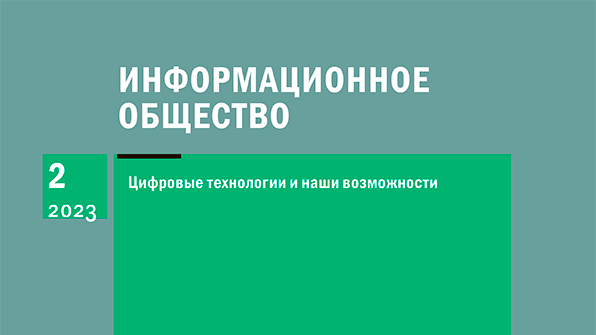The second issue of the scientific and analytical journal “Information Society” for 2023 has been published. In her address to readers, the editor-in-chief of the magazine Tatyana Ershova wrote:
I love old proverbs – even ours, Russians, even any other people. This is truly a mirror of deep folk wisdom. Take this one: “A good master is the master of money, and a bad one is a servant.” Bravissimo to the author! Whatever you insert into this proverb instead of “money”, everything will be true. For example, “ICT”. Or digital technology. Well, isn’t it?
I remember how, more than twenty years ago, theку was an campaign to “electronize” Russia. At international conferences, we only had time to fend off the nasty questions of foreign well-wishers, why we adopted a federal target program with an impressive budget, but did not bother to conduct an elementary assessment of the country’s readiness for electronic development. But since 1999, we have been hoarse to talk about it at every corner, only no one has listened to us. “Electronic Russia” sounded very fashionable, it was possible to raise good money on this – why think, you need to hammer! But we stubbornly promoted the idea of assessing the electronic readiness not only of the entire country, but also of its regions, and sectors of the economy, and, if necessary, even individual organizations, if they were seriously going to move to a new technological level.
Back in 1996, we did such a thorough job at the Russian State Library before entangling it with wires and filling it with computers. At the same time, mass “informatization” of libraries, schools, museums and other respected institutions began, but only in many of them computers stood and gathered dust, because they simply didn’t know how to use them and were afraid – suddenly you break an expensive thing! The fact that before the delivery of equipment it was necessary to train workers and take care of IT specialists was sometimes forgotten. The main thing was not to fall out of the trend. Of course, this was not the case everywhere, but campaigning, unprofessionalism and self-interest in this matter went off scale.
Since 2001 and until recently, many members of the Editorial Board of our journal have participated in the assessment of readiness for the information society in various aspects under the auspices of a number of organizations, in particular, the Institute of the Information Society, Rosatom State Corporation, ANO “Digital Economy” and others. Many people remember the well-known long-term series of Index of Russian Regions’ E-Readiness by the IIS. And the result of the participation of Russian specialists in the World Bank project in 2017 was the Digital Economy Country Assessment (DECA), which was officially recommended to all G20 countries as the basis for planning the development of the digital economy.
One of the thematic headings of our journal is “Measuring the Information Society”, and we strongly welcome articles on this topic. True, burdened with knowledge and experience in this area, we are very strict in their selection, but the rubric does not stand idle, and this is very pleasing. Today, a comprehensive model for monitoring the development of the information society in the broad sense of the word, including the development of the digital economy and digital transformation, continues to improve and keeps pace with the standardization processes in the development and use of digital technologies, such as artificial intelligence and data processing. All this allows us to hope for a masterly attitude towards these important things in our country. After all, in the current geopolitical situation, we have no other choice.
